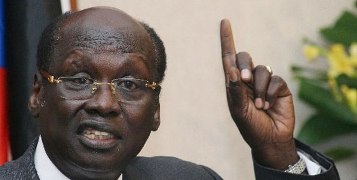S. Sudan FM hands message from Kiir to Bashir
January 9, 2014 (KHARTOUM) – The South Sudanese minister of Foreign Affairs Barnaba Marial Benjamin arrived in Khartoum on Thursday with a message from president Salva Kiir to his Sudanese counterpart Omer Hassan al-Bashir.

He also conveyed his government’s gratitude to Bashir for his interest in the stability of South Sudan as well as the assistance Khartoum provided.
Juba’s top diplomat said that South Sudan will not allow for the interruption of oil production as a result of the ongoing violence in his country. He stressed that all oil production areas are under government control.
Benjamin said that the flow of crude oil from wells located in the Unity and Upper Nile states through Sudanese pipelines is proceeding normally. He called on Sudanese media not to be misled by rumors and lies that do not lead to peace and to get news from the right sources.
The visiting official noted that they are in control of the entire country except Bor and Bentiu which are the capitals of Jonglei and Unity states respectively.
Khartoum collects a fixed fee from Juba for every barrel of oil exported through its pipelines which helps it cover a portion of its budget hole and more importantly provides a stable source of hard currency needed to import food.
So far oil production in South Sudan has not been significantly impacted by the fighting except production fields in Unity state which are now under the control of rebels loyal to former vice president Riek Machar.
Oil companies in Unity state from China and India evacuated their workers and made sure to shut down the oilfields there which are believed to have been producing around 45,000 bpd.
This week, the Sudanese oil Minister Makkawi Mohammed Awad affirmed that flow of crude from Adar Yeil’s oil field in Upper Nile state is normal adding that production there increased from 165,000 barrels per day (bpd) to 200,000.
But on Wednesday, Reuters quoted oil industry sources as saying that South Sudan’s exports of heavy sweet Dar Blend will drop to 4.6 million barrels, or about 148,000 bpd, in January in a revised loading programme, one source said, down about 21 percent from 187,000 bpd originally planned.
Dar Blend is produced in the Upper Nile state, in Blocks 3 and 7 that are operated by the Petrodar Operating Company.
Two of the seven cargoes that had been scheduled for loading in January have been deferred to February, he told Reuters.
Exports of Nile Blend, another Sudanese crude, have also dropped after production was shut in South Sudan’s Unity state last month. The grade is also produced in Sudan where output is stable.
In a revised loading programme seen by Reuters, two Nile Blend cargoes will load in January, down from three originally, the sources said. These include a cargo that was scheduled to load in December.
In a related issue, South Sudan foreign minister underscored the determination of his government to prosecute all those involved in the events that broke out last month in Juba according to the law.
Fighting broke out in Juba on December 15 between rival factions of the presidential guards amid ongoing tensions between Kiir and Machar, who is accused of orchestrating an alleged coup attempt to overthrow the government along with other senior ruling party officials many of who are now detained.
Machar has denied the allegation and accused Kiir of seeking to get rid of his political opponents.
The United States today also appeared to agree with Machar saying it sees no evidence of an attempted coup.
“We have not seen any evidence of a coup attempt,” Linda Thomas-Greenfield, assistant secretary of state for African affairs, told the Senate Foreign Relations Committee. The violence “an armed rebellion” against the government, she said.
(ST)
